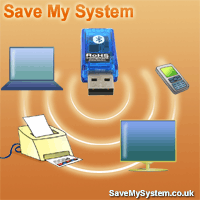Just about every household now has a computer, with many having more than one computer. With new technology constantly being developed and released, upgrading to a new computer is common occurrence. This means that there are hundred of thousands of computers that are disposed of each year. Because computer components contain toxic chemicals, heavy metals, and carcinogens, disposal in a landfill is hazardous to the environment. Today, to protect the environment and reduce waste, recycling computers has become an established method of managing unwanted computers.
There are now a number of companies and organizations that accept computers for recycling. Computer systems in good condition are labeled to be used again, and then overhauled, and sold for a discount. Computers that cannot be refurbished are taken apart and checked out for working parts. When a computer is sent for recycling, the unusable parts are separated into specific categories that include: motherboards, plastics, and metal. They are then sold to the recyclers. Anything that is not reused or recycled will be incinerated. This saves the computers from going into the landfills. Dell is one large company that has established a Computer 'Take-Back' program. Their goal is to reuse about 85% of the materials from the computers.
Another way of recycling computers is refurbishing an old computer and either resell it or give it to a charity. There are programs set up where people can drop off their computers at a specified location or they can have them picked for recycling. Staples and Dell are two companies that have such a program. You can also check with the manufacturer of your computer to see what recycling programs the company offers. If they do not have a program, there are Computer Recycling businesses that will take any computer including its system units, printers, monitors, and peripherals. As well, Dell and Apple have developed electronic end-of-life programs. You can find some type of recycling or end-of-life program in almost every state in the United States and almost every province in Canada. There are even companies that have partnered with schools to provide refurbished computers to the schools. You could also donate a computer to your favorite charity.
Another way to dispose of your computer is to contact your local government office to find out if they have special electronics pick up days where they will take the computer for recycling or proper disposal. These special e-waste collection days will also be advertised in newsletters, fliers, or in local newspapers.
Because there are so many computers that people want top get rid of each year, Computer recycling is a wise choice. With the average lifespan of computers becoming shorter, computer recycling has become a vital part of proper waste management. It is good to know that there are a wide variety of computer recycling options available so hopefully everyone will have computer recycling program near them. When you are ready for a new computer, take advantage of one of the many recycling computers programs in your area. It is always rewarding to protect the environment and help other people.
There are now a number of companies and organizations that accept computers for recycling. Computer systems in good condition are labeled to be used again, and then overhauled, and sold for a discount. Computers that cannot be refurbished are taken apart and checked out for working parts. When a computer is sent for recycling, the unusable parts are separated into specific categories that include: motherboards, plastics, and metal. They are then sold to the recyclers. Anything that is not reused or recycled will be incinerated. This saves the computers from going into the landfills. Dell is one large company that has established a Computer 'Take-Back' program. Their goal is to reuse about 85% of the materials from the computers.
Another way of recycling computers is refurbishing an old computer and either resell it or give it to a charity. There are programs set up where people can drop off their computers at a specified location or they can have them picked for recycling. Staples and Dell are two companies that have such a program. You can also check with the manufacturer of your computer to see what recycling programs the company offers. If they do not have a program, there are Computer Recycling businesses that will take any computer including its system units, printers, monitors, and peripherals. As well, Dell and Apple have developed electronic end-of-life programs. You can find some type of recycling or end-of-life program in almost every state in the United States and almost every province in Canada. There are even companies that have partnered with schools to provide refurbished computers to the schools. You could also donate a computer to your favorite charity.
Another way to dispose of your computer is to contact your local government office to find out if they have special electronics pick up days where they will take the computer for recycling or proper disposal. These special e-waste collection days will also be advertised in newsletters, fliers, or in local newspapers.
Because there are so many computers that people want top get rid of each year, Computer recycling is a wise choice. With the average lifespan of computers becoming shorter, computer recycling has become a vital part of proper waste management. It is good to know that there are a wide variety of computer recycling options available so hopefully everyone will have computer recycling program near them. When you are ready for a new computer, take advantage of one of the many recycling computers programs in your area. It is always rewarding to protect the environment and help other people.
About the Author:
At low prices and with such convenient access, renting computers is an economically viable option for those seeking quality technology. Another recommended alternative is laptop and ipad rental, which allows users to conserve money and test the platform first-hand.

No comments:
Post a Comment